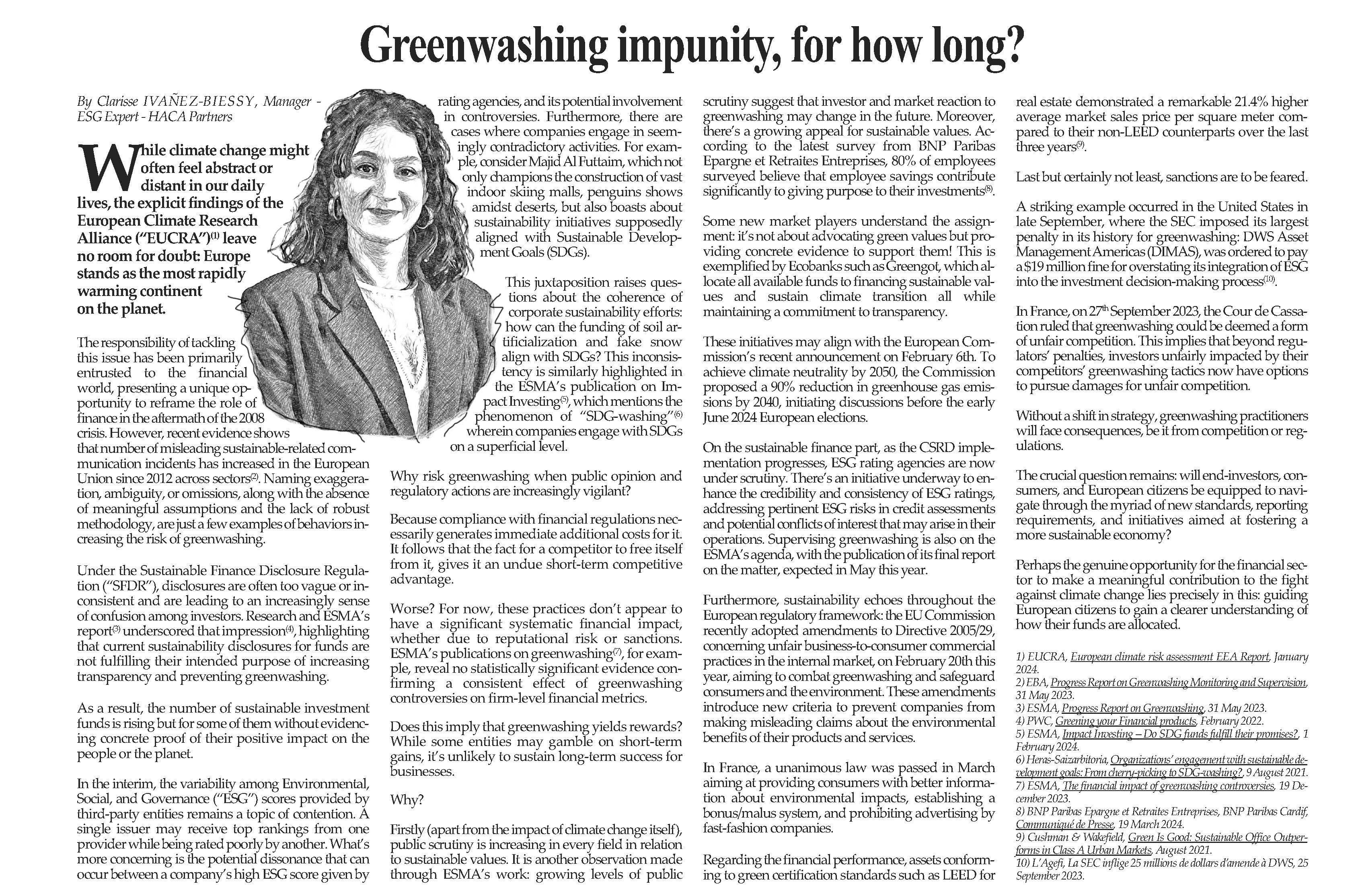17-02-2025 - Clarisse IVANEZ-BIESSY
Greenwashing impunity, for how long?
While climate change might often feel abstract or distant in our daily lives, the explicit findings of the European Climate Research Alliance (“EUCRA”)(1) leave no room for doubt: Europe stands as the most rapidly warming continent on the planet.

The responsibility of tackling this issue has been primarily entrusted to the financial world, presenting a unique opportunity to reframe the role of finance in the aftermath of the 2008 crisis.
However, recent evidence shows that number of misleading sustainable-related communication incidents has increased in the European Union since 2012 across sectors[1]. Naming exaggeration, ambiguity, or omissions, along with the absence of meaningful assumptions and the lack of robust methodology, are just a few examples of behaviors increasing the risk of greenwashing.
Under the Sustainable Finance Disclosure Regulation (“SFDR”), disclosures are often too vague or inconsistent and are leading to an increasingly sense of confusion among investors. Research and ESMA’s report[2] underscored that impression[3], highlighting that current sustainability disclosures for funds are not fulfilling their intended purpose of increasing transparency and preventing greenwashing.
As a result, the number of sustainable investment funds is rising but for some of them without evidencing concrete proof of their positive impact on the people or the planet.
In the interim, the variability among Environmental, Social, and Governance (“ESG”) scores provided by third-party entities remains a topic of contention. A single issuer may receive top rankings from one provider while being rated poorly by another. What's more concerning is the potential dissonance that can occur between a company's high ESG score given by rating agencies, and its potential involvement in controversies.
Furthermore, there are cases where companies engage in seemingly contradictory activities. For example, consider Majid Al Futtaim, which not only champions the construction of vast indoor skiing malls, penguins shows amidst deserts, but also boasts about sustainability initiatives supposedly aligned with Sustainable Development Goals (SDGs). This juxtaposition raises questions about the coherence of corporate sustainability efforts: how can the funding of soil artificialization and fake snow align with SDGs? This inconsistency is similarly highlighted in the ESMA’s publication on Impact Investing[4], which mentions the phenomenon of “SDG-washing”[5] wherein companies engage with SDGs on a superficial level.
Why risk greenwashing when public opinion and regulatory actions are increasingly vigilant?
Because compliance with financial regulations necessarily generates immediate additional costs for it. It follows that the fact for a competitor to free itself from it, gives it an undue short-term competitive advantage.
Worse? For now, these practices don't appear to have a significant systematic financial impact, whether due to reputational risk or sanctions. ESMA's publications on greenwashing[6], for example, reveal no statistically significant evidence confirming a consistent effect of greenwashing controversies on firm-level financial metrics.
Does this imply that greenwashing yields rewards? While some entities may gamble on short-term gains, it's unlikely to sustain long-term success for businesses.
Why?
Firstly (apart from the impact of climate change itself), public scrutiny is increasing in every field in relation to sustainable values. It is another observation made through ESMA’s work: growing levels of public scrutiny suggest that investor and market reaction to greenwashing may change in the future. Moreover, there’s a growing appeal for sustainable values. According to the latest survey from BNP Paribas Epargne et Retraites Entreprises, 80% of employees surveyed believe that employee savings contribute significantly to giving purpose to their investments[7].
Some new market players understand the assignment: it's not about advocating green values but providing concrete evidence to support them! This is exemplified by Ecobanks such as Greengot, which allocate all available funds to financing sustainable values and sustain climate transition all while maintaining a commitment to transparency.
These initiatives may align with the European Commission's recent announcement on February 6th. To achieve climate neutrality by 2050, the Commission proposed a 90% reduction in greenhouse gas emissions by 2040, initiating discussions before the early June 2024 European elections.
On the sustainable finance part, as the CSRD implementation progresses, ESG rating agencies are now under scrutiny. There's an initiative underway to enhance the credibility and consistency of ESG ratings, addressing pertinent ESG risks in credit assessments and potential conflicts of interest that may arise in their operations. Supervising greenwashing is also on the ESMA’s agenda, with the publication of its final report on the matter, expected in May this year.
Furthermore, sustainability echoes throughout the European regulatory framework: the EU Commission recently adopted amendments to Directive 2005/29, concerning unfair business-to-consumer commercial practices in the internal market, on February 20th this year, aiming to combat greenwashing and safeguard consumers and the environment. These amendments introduce new criteria to prevent companies from making misleading claims about the environmental benefits of their products and services.
In France, a unanimous law was passed in March aiming at providing consumers with better information about environmental impacts, establishing a bonus/malus system, and prohibiting advertising by fast-fashion companies.
Regarding the financial performance, assets conforming to green certification standards such as LEED for real estate demonstrated a remarkable 21.4% higher average market sales price per square meter compared to their non-LEED counterparts over the last three years[8].
Last but certainly not least, sanctions are to be feared.
A striking example occurred in the United States in late September, where the SEC imposed its largest penalty in its history for greenwashing: DWS Asset Management Americas (DIMAS), was ordered to pay a $19 million fine for overstating its integration of ESG into the investment decision-making process[9].
In France, on 27th September 2023, the Cour de Cassation ruled that greenwashing could be deemed a form of unfair competition. This implies that beyond regulators’ penalties, investors unfairly impacted by their competitors’ greenwashing tactics now have options to pursue damages for unfair competition.
Without a shift in strategy, greenwashing practitioners will face consequences, be it from competition or regulations.
The crucial question remains: will end-investors, consumers, and European citizens be equipped to navigate through the myriad of new standards, reporting requirements, and initiatives aimed at fostering a more sustainable economy?
Perhaps the genuine opportunity for the financial sector to make a meaningful contribution to the fight against climate change lies precisely in this: guiding European citizens to gain a clearer understanding of how their funds are allocated.
[1] EBA, Progress Report on Greenwashing Monitoring and Supervision, 31 May 2023.
[2] ESMA, Progress Report on Greenwashing, 31 May 2023.
[3] PWC, Greening your Financial products, February 2022.
[4] ESMA, Impact Investing – Do SDG funds fulfill their promises?, 1 February 2024.
[5] Heras-Saizarbitoria, Organizations’ engagement with sustainable development goals: From cherry-picking to SDG-washing?, 9 August 2021.
[6] ESMA, The financial impact of greenwashing controversies, 19 December 2023.
[7] BNP Paribas Epargne et Retraites Entreprises, BNP Paribas Cardif, Communiqué de Presse, 19 March 2024.
[8] Cushman & Wakefield, Green Is Good: Sustainable Office Outperforms in Class A Urban Markets, August 2021.
[9] L’Agefi, La SEC inflige 25 millions de dollars d’amende à DWS, 25 September 2023.
